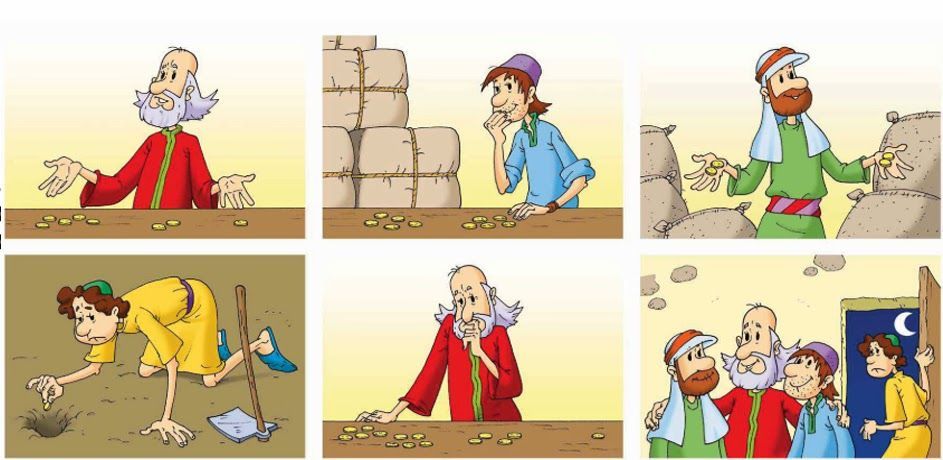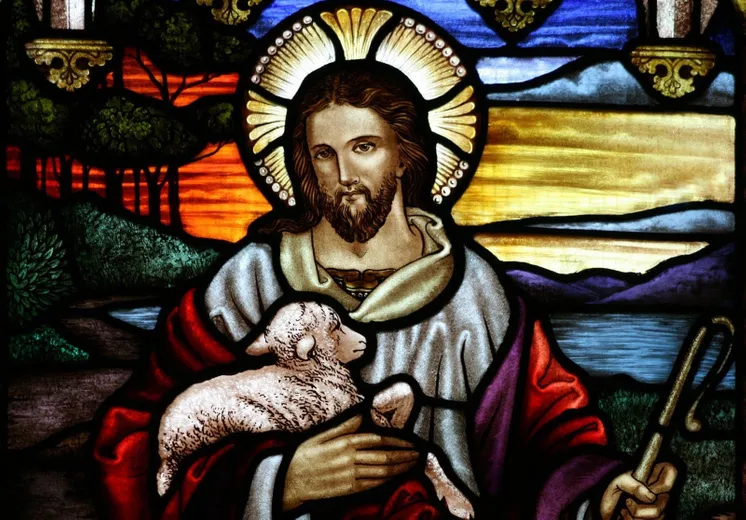The Parable of the Talents According to Saint Matthew
In today’s article we are going to talk about one of the most debated topics regarding its meaning in the Bible: The Parable of the Talents according to Saint Matthew. This parable is located after the parable of the ten virgins and is part of an even larger speech that is related to the final judgment. It also tells us about how God gives us his gifts and talents for us to develop. Find out what this parable says, how it relates to the others, its meaning and much more.
The Parable of the Talents
The first thing we should know is that the word Parable or “Mashal” is defined as the narration of an invented event where a moral teaching is sought. In this case, we will refer to a literary parable that we can find in the Bible and that has a pedagogical and moral character; since it seeks to convey a message to everyone who reads it. In turn, another characteristic of the parables is that it is transmitted as a story which is accepted as true by the majority of the population.
With this we do not want to question the veracity of the parable of the talents, we only transmit the corresponding definition to the reader. In addition, the reason why the veracity of the story is doubted revolves around the impossibility of obtaining a verification of the narrated facts.
Returning to the parable of Saint Matthew, it is a narration that belongs to his gospel (25; 14-30) and that is related to the parable of the pounds or the parable of the ten ounces that is narrated in the gospel of Saint Luke ( 19;11-27). Both stories resemble each other, seeking to convey similar messages and highlighting the teachings of Jesus Christ.
Specifically, this parable can be found after the parable of the ten virgins, being a small part of a much more complete narrative where the central issue to be addressed is caution when the final judgment arrives. Its meaning has been widely debated due to how in the narrative a criticism is made when it was pronounced during the ministry of Jesus Christ.
Despite this, the main teachings for Christianity revolve around how God entrusts his abilities, gifts and talents to us, the men of the world. In this way he gives us the responsibility to develop them so that each man can generate fruits from them. In turn, Jesus openly and directly criticizes us if we allow ourselves to be carried away by fear, laziness, conscious omission, excessive precaution or cowardice. Preventing us from developing these wonderful gifts that have been given to us, preventing us from growing as people and Christians.
What does the Parable of the Talents according to Saint Matthew say?
Next, we proceed to mention all the content of the parable of the talents that we find in the Gospel according to Saint Matthew:
“ For the kingdom of heaven is like a man who, going far away, called his servants and gave them his possessions. To one he gave five talents, to another two, and to another one; to each according to his ability and then go far away.
He who had received five talents went and traded with them, thus gaining another five talents. Likewise, the one who had received two, gained another two as well. But the one who had received one went, dug in the ground and hid the lord’s money from him.
After a long time, the lord of those servants came and settled accounts with them. So he went one by one, first he spoke to the one who had received five talents who brought him another five talents, saying: ‘Lord, you gave me five talents; and here you are, I have gained another five talents over them.’ Whereupon his mistress replies: ‘very well, good and faithful servant; You have been faithful over little, I will put you over much; enter into the joy of your master.’
Now he goes to the one who had received two talents and he says to him: ‘Lord, you gave me two talents; and here you are, I have gained another two talents over them.’ His mistress said to him: ‘Well done, good and faithful servant; You have been faithful over little, I will put you over much; enter into the joy of your master.’
Finally, he turns to the third one who received a talent and he tells him: ‘Lord, I know you and I know that you are a hard man, that you reap where you did not sow and gather where you did not spread; for this reason I was afraid; and I went and hid your talent in the ground; here you have it sir, what is yours’. In response, his master said to him: ‘You evil and negligent servant, you knew that I reap where I did not sow and that I gather where I did not spread. Therefore, you should have given my money to the bankers, and when I came, I would have received what is mine with interest. So take away his talent! and give it to him who has ten talents. For whoever he has will be given and he will have more; and from whom he does not have, even what he has will be taken from him. And throw the unprofitable servant into the outer darkness; there will be weeping and gnashing of teeth’. «
Reflection of the Parable of the Talents
This parable corresponds to one of several that were said by Jesus Christ in life, and that was narrated in the Gospel of According to Saint Matthew. Better known as the parable of the talents.
The purpose of this story is to alert, prevent and make everyone aware so that they do not fall asleep, act passively or are afraid to develop the skills and abilities that the Lord is giving us. Since he will come at some point and he hopes that with the little or much that he gives us, we will be able to achieve many more things and multiply all the original gifts, talents and abilities that he gave us. This is what dictates the will of the Lord, united with Christ in the power of the Holy Spirit.
As you can see, the parable is not very long, but even so, it has a lot to reflect on, since it addresses different points that we will be dealing with in depth.
The first message that we can rescue from history is the parallel between the Lord and his faithful with God and us. Since God is our shepherd and we are his humble servants. Then comes the first big reveal, not all people are the same or have the same talents or abilities. In the parable each is given a different number of talents. Which is similar to what happens in reality: human beings have different capacities at different levels. This means that we are all different and unique, but it does not mean that this is a bad thing or a disadvantage.
In the parable no distinction is made between the servants, stating that one is better or worse than another; nor is it suggested that one who has five talents is better than one who has only one. Since in the eyes of God we are all equal. This concept must be central in our lives since it can be a cause of envy, hatred, anger and greed. Therefore, we must be able to accept and love ourselves as we are, appreciating each of our virtues and our defects.
Feelings such as envy, hatred and anger usually arise when we do not appreciate all our abilities and fill ourselves with feelings of inferiority when comparing ourselves with other people. This is another mistake we make on a daily basis, the belief that we should constantly compare ourselves to others and seek to prove that we are better than them. On the other hand, and following this same line of thought, we can run the risk of deviating from the path of God’s word and seeking to fulfill goals and objectives for the wrong reasons.
This can cause us to be greedy, conceited and arrogant people over time. What is worse, instead of helping others, we would end up taking advantage of them to increase the false sense of power. Another aspect addressed in the parable is what happens when we decide for one reason or another not to do anything with the gifts and talents bestowed by the Lord. Here you can see two very different scenarios, on the one hand there are those who decide to work and take risks to multiply these gifts. Where perhaps they can have a lot or a little success; but they will always end up with a greater number of virtues than with which they began their journey.
Instead, for those who decide not to develop their abilities for one reason or another, the end will always be the same; that is, to keep the same talent or rather, to waste that talent. In this sense, the Lord gives us an idea of the many reasons that can cause us not to develop our talents and multiply them. Being in the case of the parable, the fear of failure. The servant tells the lord that he was aware of what was expected of him and that he should work to multiply his talents, but that he decides to settle for what was given to him to avoid failing.
There is not much to say about it that has not already been said, it all boils down to the fact that if we do nothing, it is impossible to achieve a flattering result. Laziness is usually another of the most common reasons that makes people decide not to work, develop their skills and grow as a person. Jesus Christ in many passages of the Bible speaks to us of the risk of laziness. Also; we must remember that this is a capital sin.
In Saint Matthew’s narrative, the lord gives the gifts to the three servants and allows them to do as they please. Making a reference to free will and the ability that each one of us has to say about our actions and our future. This implies that it is up to us to follow the path indicated by God. Although we have to be aware that we must assume the consequences of our actions.
Point that is also touched at the end of the parable when the lord confronts his servant and recriminates him for being aware of what he should do and even so, he decides to choose the wrong path; causing the gift that was given to him to be taken from him and he is expelled into darkness.
It is also mentioned that those who are fruitful and develop their abilities will have a greater chance of getting more boons than those who have little and put in much less effort. This means that the path becomes very difficult when we start a task, but as we move forward, grow and learn more and more, the path stops being complicated and we begin to notice much faster growth.
This is something very simple to verify, since there are countless examples around us. Think about how difficult it was for you to learn a second language, play an instrument, or play a sport. In its beginnings it was sure very demanding, but as you began to grow the difficulty decreased.
It occurs in all aspects of our lives, which is why; God inspires us with his grace to be persevering, devoted to faith and to work with dedication to multiply all our talents. Taking into account that each one has unique and deferential capacities to the rest of the people. This is indicated in the narration: «according to his capacity«.
This brings us back to the fact that each man and woman are different from each other, so it is natural that the fruits that each person reaps will be different even though some have tried more than others. Remember that it is not worth focusing on the performance of others, but on your own and giving 100% in everything you set out to do; doing this the lord will receive you with open arms.
Another fundamental aspect of this story is the blessedness possessed by those who are found at the return of the Lord Jesus carrying out his will, that is; doing what he told us to do. This means that no matter how many sermons we hear, if we do not put his word and teachings into action, we will end up receiving his whipping and being destined for darkness for not following his will. We can also appreciate this message in the Gospel according to Luke (12;47):
“ The servant who, despite knowing the will of his lord, does not prepare himself to fulfill it, becomes the creditor of many lashes “ .
Different Versions of the Parable of the Talents
In the bible we can find two versions of the parable along with an additional apocryphal writing dating from the second century AD:
- The one we find in the Gospel of Saint Matthew.
- The one that appears in the Gospel of Saint Luke.
- The one we find in the Gospel of the Nazarenes.
This last version, which belongs to the Gospel of the Nazarenes, is the one that has the least similarity with respect to the other two. Here three servants are shown in history who are characterized by:
- One of them multiplies the entrusted money.
- Another buries the money in a similar way to the other parables.
- The third, squanders the money on prostitutes and flute players.
Then, the moment the lord arrives, he receives the first servant with approval, the second is censured, and the third is imprisoned. This alternate view of the parable places greater emphasis on the unfaithfulness of the third servant in following a dissipated life. It is believed that the intention behind this story is to moralize the faithful in the context of the Judeo-Christian church.
Parable of the Ten Pounds According to Saint Luke
We already mentioned the parable according to Saint Matthew, now we will leave you with the Parable of the Ten Pounds from the Gospel according to Saint Luke (19;11-27) so that you can appreciate the similarities between both narratives:
« Then he said, a noble man went to a far country, to receive a kingdom and return. He sent for ten of his servants and gave them ten pounds. Then he told them: ‘Do business while I return.’
But his fellow citizens hated him and sent an embassy after him, saying, ‘We do not want this man to rule over us.’
Once he returned and after receiving the kingdom, he ordered those servants who had given them the money to be called before him, to find out what each one had negotiated.
The first came, saying: ‘sir, your mina has won ten mina’.
To which he replied: ‘It’s fine, good servant; because you have been faithful in a little, you will have authority over ten cities.’
Then he went on to the next one and said: ‘sir, your mine has produced five mines’.
The lord then says: ‘you will also get the authority of five cities’.
Another approaches saying: ‘ señor, here is your mine, which I have kept in a handkerchief; because I was afraid of you, because you are a harsh man, taking what you did not put in, and reaping what you did not sow.’
The lord responds by saying: ‘m the servant, by your own mouth I judge you. You knew that I was a severe man, that I take what I did not put in, and that I reap what I did not sow; Why, then, did you not put my money in the bank, so that when I returned, I would have received it with interest? Take away the mina, and give it to the one who has the 10 minas’.
All the others replied: ‘but sir, he has ten mines’.
The man continues saying the following: ‘ Well, I tell you that to everyone who has, more will be given; but from him who does not have, even what he has will be taken from him. Also those, my enemies who did not want me to reign over them, bring them here, and behead them in front of me’. «
Source and Type of Parabola
After reading the parable of the talents according to Saint Matthew and According to Saint Luke, it is easy to think that both literary narratives come from the same source story. This concern has been the subject of numerous studies for many years. In principle, during antiquity; the belief was that each story came from a different source, that Jesus mentioned them in two different places and times. But over the years, this has been questioned.
The author CH Dodd made a comparison between the two parables to verify the number of words that coincided with each other, determining that the result is not significantly enough to support the claim that both parables share the same origin story. In any case, it is widely accepted by most specialists today that these parables do have a common source story. Known as the “Q Source”, which is hypothetical, but is believed to be the root of the parable that appears in the Gospel according to Saint Luke and according to Saint Matthew.
Both parables have an allegorical meaning and their objective is mainly pedagogical. That is, seek to transmit knowledge to everyone who reads them.
quotes to reflect
Below we leave you with some of the most remarkable fragments that encourage reflection on the parables that appear in the Gospel according to Saint Matthew:
The Unfaithful Servant – Matthew (24;48-51)
« But if that evil servant says in his heart: my master is not long in coming; so that he will start beating his fellow servants, and go on eating and drinking with the drunkards. The master of that servant will come on a day that he does not expect and at an hour that he does not know. Then he will punish him severely and put his part with the hypocrites; there will be the weeping and the gnashing of teeth « .
The Ten Virgins – Matthew (25;11-13)
« Then the other virgins also came, saying: Lord, Lord, open for us!
But he, answering, said: Truly I tell you, I do not know them. Watch therefore, because you do not know the day or the hour in which the son of man is to come “ .
The Parable of the Talents – Matthew (25;29-30)
« For to everyone who has, more will be given, and he will have an abundance. Whoever he does not have, even what he has will be taken away.
And throw that useless servant out into the darkness, where there will be weeping and gnashing of teeth .
The Judgment of the Nations – Matthew (25;44-46)
« Then they will also say to him: sir, when did we see you hungry, thirsty, a stranger, naked, sick, or in prison, and did we not serve you?
To which the Lord will respond by saying: Truly I tell you, when they did not do it for any of these little ones, they did not do it to me either. And these will go away to eternal punishment, and the righteous to eternal life .
If the information you have found here has been useful to you, then you may also be interested in reading:






